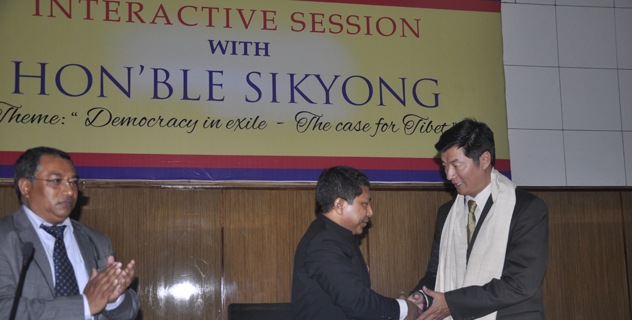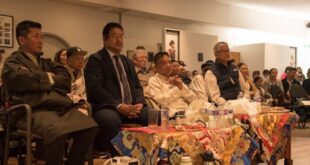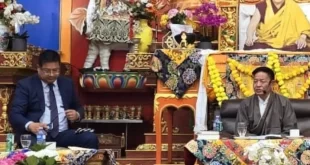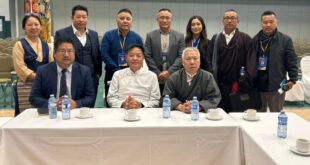tibet.net
February 5, 2014 4:59 am
DHARAMSHALA: After attending the opening day of the festival of Tibet in Guwahati in Assam on 2 February, Sikyong Dr. Lobsang Sangay travelled by road in a convoy with police escorts to Shillong, known as the Scotland of East, arranged by government of Meghalaya as the State Guest. Along with Tibetan spiritual leader His Holiness the Dalai Lama, the Sikyong is also on a visit to Shillong as the State Guest.
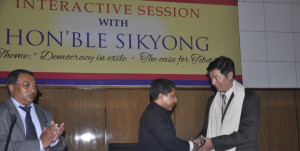
The Governor and Chief Minister of northeastern Indian state of Meghalaya today hosted receptions in honour of Sikyong Dr. Lobsang Sangay, the Harvard educated scholar and political successor to His Holiness the Dalai Lama. Sikyong Dr. Lobsang Sangay is on a two-day visit to the region.
The Chief Minister of the state hosted a dinner reception in honour of the Sikyong’s first ever visit to the region. Earlier in the day, along with His Holiness the Dalai Lama, Sikyong attended a luncheon reception hosted by Governor Dr K K Paul.
Sikyong, who is a Harvard educated scholar, addressed a distinguished audience of the top echelons of the state government and academicians at a interactive session on a theme titled: Democracy in Exile: The Case for Tibet.” Top officials and academicians including Chief Minister Dr. Mukul Sangma, members of legislative assembly, chief secretaries, principal secretaries, superintendent of police and vice-chancellor of Martin Luther Christian University and editors of the media attended the event.
Sikyong spoke about the democratic process in the exile Tibetan community, the election process and the challenges he faced after getting elected as the political successor of His Holiness the Dalai Lama. “In 2011, His Holiness the Dalai Lama made a historic decision to devolve all his political authority to the elected leadership. With no experience in the administration, I ran for the election and got elected. As I was the leading candidate, I had to assume the responsibility. It is a daunting and a very difficult task to fill in a shoes of a Nobel Laureate, global statesman and one of the greatest spiritual leaders. However, based on my individual and the collective Karma of the Tibetan people, I chose to move forward and took the political responsibilities. It has been over 2 years and I have stabilised the Tibetan community.”
Sikyong spoke about the element of Tibetan democracy by recounting how he and other candidates campaigned for the leadership of the Central Tibetan Administration. “During the campaign, I and my counterpart shared the same taxi, room and campaign tips. The Tibetan democracy is more of movement than classic conventional election that we run.”
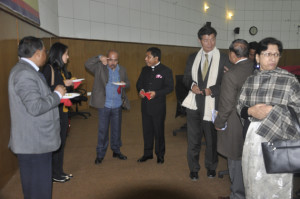
Responding to a question on his efforts to resolve the issue of Tibet, Sikyong said: “We do believe in dialogue and non-violence as a means to resolve the issue of Tibet. The Central Tibetan Administration is committed to its Middle Way policy as the only viable option to find a lasting solution to the issue of Tibet. We hope the new Chinese leadership by Xi Jinping will find the political will power and wisdom to engage in dialogue with the Tibetan leadership to find a lasting solution to the Tibet issue.”
In his address, Chief Minister Dr Mukul Sangma, who traced his ancestors belonged to Tibetan, said it is a privilege for him and his colleagues to hear from Sikyong about the remarkable story of Tibetan democracy and get enriched about the basic concept of Tibetan democracy in exile.” Applauding the efforts made by Sikyong to travel to different parts of the world to meet his people and get connected with them, Dr. Sangma said this will help to build a vibrant and stable democracy.
An IAS officer working in the state government said he was enthralled by the Sikyong’s oratory skills and how he articulates the issue of Tibet in a very enthusiastic way.
Later in the evening, Sikyong attended a dinner reception and musical gala hosted by the Chief Minister.
Earlier in the morning, Sikyong attended a day-long teaching of His Holiness the Dalai Lama on the 37 Practises of the Bodhisattvas at the polo ground. He addressed the Tibetan public and met students at the Sambhota school as well.
Sikyong will leave for Guwahati on 5 February to address the closing ceremony of the Tibet festival as the chief guest the next day.
